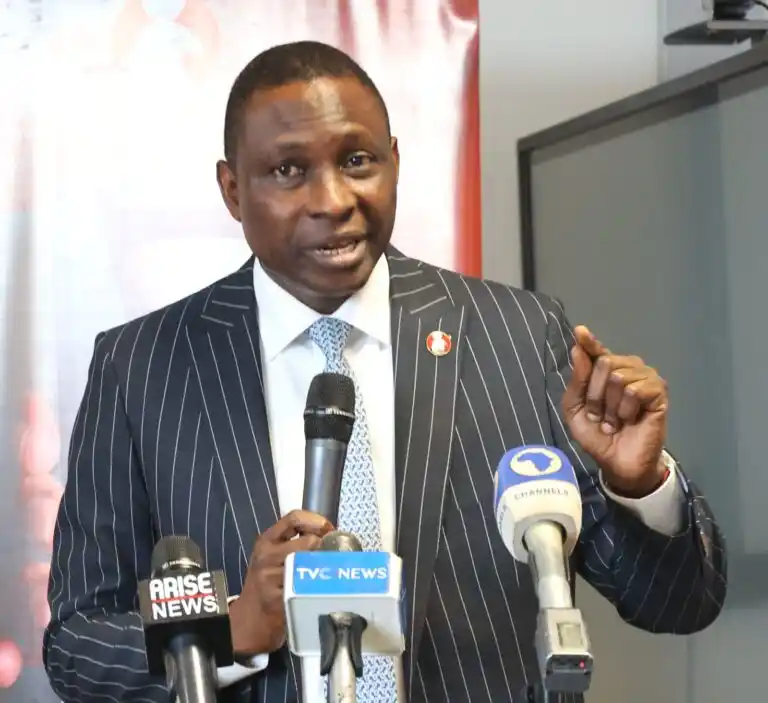The Chairman of the Economic and Financial Crimes Commission (EFCC), Ola Olukoyede, has stated that no major financial fraud, particularly illicit financial flows, can occur without the support of lawyers.
Olukoyede made this remark during the opening of the 6th Annual Criminal Law Review Conference in Abuja. The five-day event, organized under the theme “Optimising the Administration of Criminal Justice in Nigeria: How to Navigate Emerging and Systemic Challenges of Insecurity and Economic Hardship,” was reported by the News Agency of Nigeria (NAN).
According to the EFCC chairman, lawyers play a crucial role in transferring large sums of money into offshore accounts, especially in tax havens.
“The most traumatic discovery of the EFCC in recent years was the subjugation of national interest and wellbeing to personal interest by lawyers who aided briefcase foreign investors to fleece the nation in dubious transactions,” Olukoyede said.
He cited the P&ID scam, the Mambilla Power Project, and the Sunrise issues as key examples of such fraudulent activities.
While noting that the anti-graft agency had successfully prosecuted judicial officers and senior lawyers, earning convictions, Olukoyede emphasized that his respect for the judiciary and senior members of the bar remains intact.
“However, based on the unique experiences of the EFCC in the prosecution of corruption cases, I am particularly interested in systemic reforms in our justice delivery system that capture: The process for the discipline and regulation of judicial officers. The regulation and discipline of legal practitioners. Ethics, values and standards of legal practice. These are essential to me because the job of EFCC is ensuring that the corrupt does not find space in our national life. And when they do, to make them pay for their deeds,” he added.
Olukoyede also called on the judiciary to address the issue of excessive legal fees charged by senior lawyers for services rendered to political office holders, particularly the questionable manner in which these fees are collected.
“If a lawyer would not care about the source from which a sitting governor or any other public servant pays him millions of naira to defend him in an electoral tribunal, the lawyer must necessarily be mindful of the fact that the only proper way to collect such humongous amounts is through the financial system,” he said....Read Full Article [Click Here>]
He further explained that such practices not only violate money laundering regulations but also serve as a means for tax evasion. Olukoyede stressed that senior lawyers should lead by example and uphold the ethical demands of the profession.
Lateef Fagbemi, SAN, the Attorney-General of the Federation (AGF) and Minister of Justice, addressed the conference and said the nation faces significant challenges due to insecurity and economic adversity, which threaten the rule of law and justice administration.
“These challenges demand innovative, practical and collaborative approaches to ensure that our justice system remains robust, fair and effective,” Fagbemi remarked.
Represented by the Director of Public Prosecutions, Abubakar Baba-Doko, Fagbemi assured that the Federal Government, under President Bola Ahmed Tinubu, is committed to reforming and strengthening the criminal justice system.
He highlighted efforts to address the root causes of crime, enhance law enforcement capabilities, and improve the efficiency of the courts, while also emphasizing the need to strengthen institutions, leverage technology, and foster public trust.
Justice B.B. Kanyip, President of the National Industrial Court of Nigeria, also spoke at the conference, noting that the Administration of Criminal Justice Act (ACJA), 2015, is a significant piece of legislation aimed at improving efficiency in Nigeria’s justice system.
Represented by Justice Olufunke Anuwe, Kanyip explained that the ACJA facilitates the swift processing of criminal cases, decongests correctional centers, and safeguards the rights of marginalized individuals. However, he acknowledged that insecurity and economic challenges threaten the effective implementation of the Act’s provisions.





